#narrative continuity and predictions for where The Story Will Go
Note
Why do you think the Sans Darkener theory is ridiculous? From the blood, to the teleportation/other weird powers, to his almost otherworldly meta-awareness, the toilet references, and his bedroom door, the "never see em again"/"dont forget". He's clearly not just a regular monster.
And Ralsei is a darkner who's weirdly based off Asriel and who seems to be special when compared to other darkners. And it's not yotally clear what his overworld counterpart would be (a toy or a real goat idk.) Sans Darkner theory honestly doesn't feel like a huge stretch to me.
good job on bringing up ralsei's case, because that's exactly my point against the theory!
ralsei is different from other darkners. he calls himself the prince of the dark, THEIR prince. he's apparently the only darkner who can seamlessly exist in dark worlds that aren't his own AND MAYBE. just maybe!! exist in the light world for short amounts time. and no, I really don't believe he's based on a real goat, buddy. i think at best he's based on kris' fake horns to represent their feelings of inadequacy over being human. and those horns helping them feel like they fit in more.
the dark fountain that created him, the one in castletown? literally the strongest in the game. at the beginning of chapter 2 he mentions "sensing" a new fountain being opened, so he rushed on site to help out. remember that he said that he was alone, so if sans WERE a darkner of ralsei's caliber, he'd have to be from ANOTHER dark fountain just as powerful as his own (and what would the purpose of that fountain be, why should it be different from the others), he'd have to be based on an object (which he's clearly not) and ralsei would know about him. so why hasn't he given even a single HINT that there's someone like that out in the light world? especially since it'd have to be a very recent event, sans has just recently moved into hometown, after all!
sure you could technically cover all this up with "oh but what if ralsei is lying" which is fair, i ALSO think he's lying about a fuck ton of stuff. so let's look at this from a narrative angle: making sans deltarune a special darkner who "ascended" to the light world but is also doing fuck all, has no relevancy to the plot so far whatsoever and who has given no indication of being aware of your actions, having time space powers OR being anywhere as meta aware as he is in ut (one joke about game release times aside, and even susie makes one of those), would give him a level of relevancy/importance comparable to one of the main characters. and I really doubt that's the case.
it's one of the few reasons that make me question how i approach the otherworld theory too. do you really think that at some point, or the ending specifically, if all dark fountains other than one (ie castle town) have to be closed, that deltarune's story will revolve around........ sans. lmao no. come on. whatever happens will have to be collateral at best, and likely hidden, just like his backstory lore in undertale.
all things considered, I don't think darkner!sans is a theory people pulled entirely out of their ass. it's clearly based on things and details that are meant to make you think and put them together. i just think this particular theory put them all together backwards.
in deltarune sans isn't a darkner in the lightworld. he's the exact opposite. in undertale
#i don't like theorizing about dr especially the ending I don't think we have enough info yet#but !! but !!!!! i do have my ideas . based on very little actual evidence and more like#narrative continuity and predictions for where The Story Will Go#with its messages with its themes and with the conflicts it's set up#hold on i wanna write a post about this . i wasn't going to at first but now i want to write it down in case i end up being right#answered asks#sans#deltarune#entry log#ralsei
75 notes
·
View notes
Text
It shouldn't be that serious but I haaate people summarizing Simon and his struggles in Fionna and Cake as the symptoms of one mental illness or another. Like, his struggle with being content now that he's Simon again echo depression and he very well may have it. The way I've seen some people examine his character and conflict through a pathological lens, though, just picks out what words and actions they can diagnose as some documented and studied condition. They divorce his character and conflict from his setting, his time as the Ice King, and how he fits in the extended narrative of Adventure Time.

Simon is a pre-mushroom bomb era human in a post-mushroom bomb world. The people he knew, the surroundings he's come to understand, and the life trajectory he had going are all long gone. He's come to in a new society where things function in much more fantastical, irrational, and advanced ways. He's been a part of this society- even shaping it- as the Ice King, and now he must continue playing into the happenings of Ooo as Simon Petrikov. The new civilizations are alien, the new Earth functions by new social and natural laws, and he has the remains of new life that disgusts, horrifies, and humiliates him.
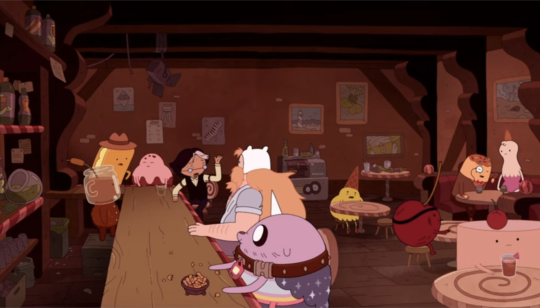
Simon spent almost a thousand years as a man stripped of his former values, dignity, and cognisance. As the Ice King, he lost his ability to control himself, and inflicted what would accumulate to be significant harm unto others. He learned how to get along with others by the end of his time as the Ice King, but those years were a blip in the span of a near millennium, and the degree of self-control he learned was basic decency. Simon spent his life before the mushroom bomb developing to be a composed and academic man, and endured having his antecedent personal growth and his own autonomy regarding his identity nullified by the ice crown.
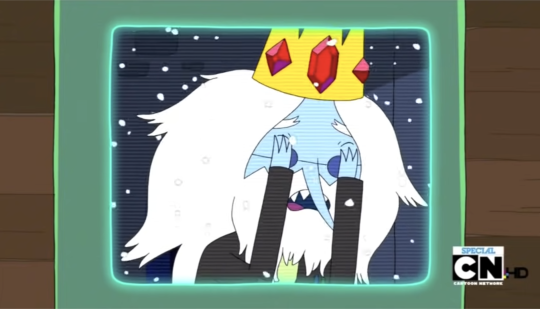
Adventure time is a fantasy show that explores the consequences of the endless possibilities inherent to a fantastical setting. Powerful magic and magical existences destroy and ruin lives, abundances of mystical organisms amount to exhausting effort to defend oneself from danger, and the lack of predictability of what the world has to offer someone next spells out a compromised sense of security and stability.

Simon/the Ice King's story is one example of the show's exploration of the undesirable side of fantasy, and one story that's been built on for over eight years now. It's a story with circumstances unique to the show, with numerous writers informing its contents, with some parts planned and some spontaneous. It's a charged story, and it's narratively reductive to effectively whittle Simon's character and conflict as the showing of a real world mental illness
#messages from mars#adventure time#fionna and cake#simon petrikov#the ice king#atimers#damn i did not mean to write an essay but his character means a lot to me#for the record i relate to him a lot from a real-world angle (i became disabled and lost a lot of myself) but i don't like the idea of#taking how i relate to him and making that my whole character interpretation of him#especially since I've been watching the show and following simon's story since before i became disabled
850 notes
·
View notes
Text
Last Twilight Episode 12
A month ago, I never could have predicted that I’d be sitting here trying to assemble some thoughts to explain how on earth this show went so badly off the rails. I am truly taken aback by where this story landed, and I advise anyone who wants to think of it fondly to just pretend it ended at episode 9, and even skip the finale if you haven’t watched yet. Before I get into it, let me just start with a word of praise for the cast, who did a great job with their performances and kept this show afloat when the writing fell apart. And boy, did it fall apart.
In my view, this narrative had three main threads it was addressing: 1) Day’s journey to accepting his disability; 2) unresolved family trauma; and 3) Mhok and Day’s romance. And in the end, it failed on all three of them. I am going to dig into this and I am not feeling particularly nice, so if this is going to hurt your feelings I suggest you stop reading now.
Day’s Journey
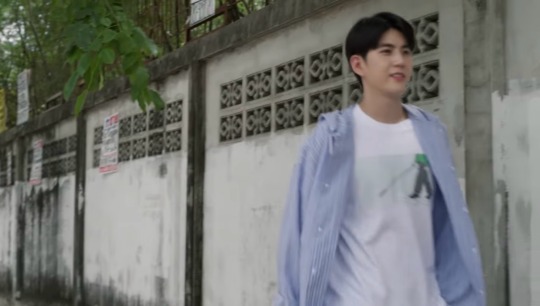
Just…wow. We have been afraid of this turn the entire time and trying to hold out hope that the show would not go there, but here we are. I started laughing out loud when we got to the end of part 3 and Mhon’s phone went off with an alert for a new eye donor, and then just stared incredulously at my screen as we time skipped AGAIN to a Day whose vision had been restored for years (last week I joked to @bengiyo and @waitmyturtles that once a drama starts using time skips it becomes addictive and they never stop, and—welp!). What was this entire show for? Why did we spend twelve episodes with Day grieving his vision loss, learning how to cope, and finally accepting his blindness only to completely undercut it at the end? The first part of the finale was so much about how he was thriving—finding a new career for himself and becoming self-sufficient and growing so much on his own—only to give us an ending that implied he could not actually have his happily ever after without his vision restored.
And this is in fact the message they sent by coupling the return of his vision with the return of he and Mhok’s relationship, and giving us a happy ending rooted in his contentment at having his sight back. They even went back to the Last Twilight mountain to completely tarnish the thematic resonance of the original scene. Calling back to the beautiful memory of Day “seeing” the sunset and experiencing “a moment so good that you feel like you can live there forever” as he accepted his disability with this scene of him seeing the real sunset with his restored vision was so hurtful to me that I actually got angry. Day didn’t need his vision back to get a happy ending, and I absolutely hate what this communicates about disabled people’s capacity to live happy and fulfilling lives. This show has created many writing sins but this is the most unforgivable to me.
Family Trauma
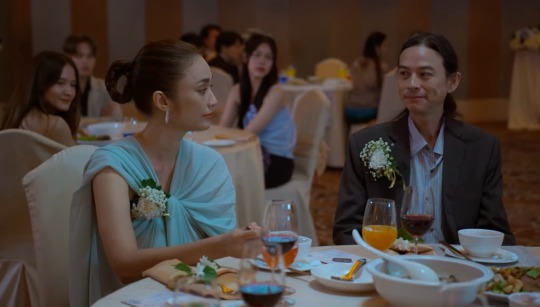
The show began dropping the ball on this one a few weeks ago, but this finale put the nail in the coffin. We spent most of this episode at Porjai and Night’s wedding, an event that might have felt meaningful if the show had let us see any of their romance. I’m grateful to Mark Pakin and Namtan Tipnaree for their beauty and charisma because it’s the only thing that made me care about those scenes at all. Rather than actually being about them, however, this wedding was used primarily as a clunky vehicle to deliver heavy-handed messages about “second chances” to encourage Day to get back together with Mhok (more on that in the next section).
I did enjoy the brief nods in this episode to the brothers continuing to have newfound harmony in their relationship, but where the show really lost me was in their attempt to bring Night and Day’s dad back into the mix and imply some sort of resolution between him and Mhon. Mhon, a woman whose perspective on their split we never actually saw, whose motivation for her choices and behavior toward her sons were completely elided by the narrative, who was forgiven and made peace with offscreen during a time skip. I was never given the chance to understand her or what this relationship meant to her in the first place, so why would I care about these scenes with her making her peace with this man? I continue to be so confused about where this show chose to spend its time, and why someone with Aof’s track record on developing strong and narratively important familial relationships dropped the ball so much with her.
The Romance
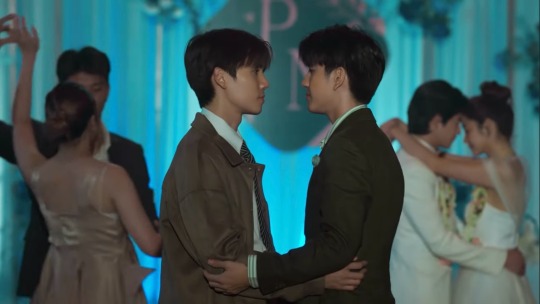
Okay, let’s get into it, and remember what I said about not reading if this is going to hurt your feelings! My criteria for considering a romance successful is I have to believe the relationship is mutual, beneficial to both of the pair, and that the couple is prepared to weather future challenges. Last Twilight’s romance fails on all three fronts, and it all comes down to the total imbalance in the relationship that persisted right through the final scenes.
This entire narrative has been Mhok bending to Day’s will, giving Day what he needs, forgiving him for everything, and letting him make all the decisions about the relationship, and the finale was regrettably more of the same. In episode 11, Mhok made a mistake when he lied to Day about turning down the job in Hawaii. But he made that mistake out of grief and fear, and Day didn’t care—he unfeelingly rejected him and his pain and ended their relationship without a second thought. That was potentially forgivable as a momentary lapse borne out of instinctual hurt, and could have been repairable had Day reconsidered soon after and extended Mhok some grace. But in this episode, we find out Day blocked Mhok and refused to communicate with him again after that night, and has left Mhok completely in the cold for three years after he failed to be perfect one (1) time.
And this episode? Was on Day’s side in this conflict. Mhok is the one to return and start pursuing Day again. Mhok is the one to broach the topic of their breakup. Mhok is the one to thank Day for breaking his heart and tell him he did nothing wrong (y’all, I almost threw something at the screen). Mhok’s grief and trauma go completely unaddressed in this finale until they try to play the Rung card for one last moment of sentiment. Day cries to his mother about how he just doesn’t know if he can forgive Mhok. And in the end, Mhok makes the grand gesture, missing his flight to go to Day and stay in Thailand with him despite the successful life he has built in Hawaii.
The cognitive dissonance I felt watching this play out was extreme. I rarely see a writer misunderstand their own characters and relationship conflict so thoroughly. In order to believe in this romance we needed to see Day finally show some empathy for Mhok, take responsibility for his own mistakes, and be the one to make an effort this time. We needed to believe that Day has the capacity to be a supportive partner to Mhok even when he’s struggling. But Day didn’t demonstrate any of that, and so I simply don’t believe in this relationship. I don’t believe Mhok can trust Day not to abandon him again when some other major life event intervenes and Mhok is less than perfect. And that’s a shame, because the show really almost had something here with these two.
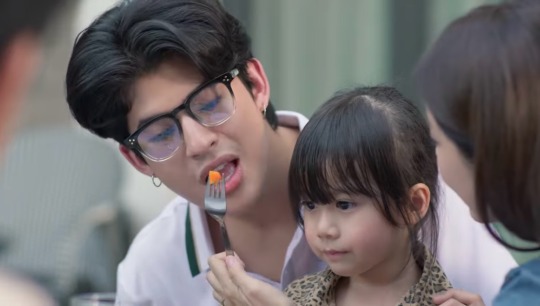
And that’s all I got. What a disappointment this show turned out to be. If you need me, I will just be over here in my little corner imagining the Night and Porjai romcom that we never got and pretending the rest of this show ended several weeks ago.
386 notes
·
View notes
Note
I'm so curious to hear your thoughts. do you think Gabriel will ACTUALLY die? Or Nathalie? or will they both get healed??? Will Emilie actually get revived? The latter was always something I thought the show would do, but I also feel like this show is hard to predict sometimes. If Emilie does come back, I can't imagine she'd be too thrilled when she learns what Gabe's been up to that the two of them would go back to being a happy loving couple. #eminath2022
honestly it's SO HARD to predict how this series could possibly end. Adrien's story is so clearly set up as a tragedy, completely doomed by the narrative, and there's sufficient foreshadowing that he could possibly die/be sacrificed.... but I also believe that IF that happens he'd be revived and will ultimately receive a happy ending, because he's a main/beloved character of a children's show (also future-chat noir was alive in timetagger). So how will Adrien get a happy ending? Who will parent this child? UHHHHH
Personally, I really hope they don't revive Emilie, even if that's maybe the most obvious way for Adrien to have a happy ending. I think it'd maybe be a little questionable for kids who watch the show and relate to Adrien's struggles of losing a parent, and also I think that it'd kind of... prove Gabriel right? I think Gabriel would happily sacrifice ANYTHING, including his own life, to save Emilie, and I think him essentially doing that, sacrificing EVERYTHING to revive Emilie, and then everyone in the show being better off for it and it being the "happy ending" would kind of mess with the themes. Gabriel isn't supposed to be right. He's supposed to be wrong, he's supposed to be deluded that Emilie can be saved, he's supposed to be wrong in refusing to mourn her properly and move on, and with those themes in mind I don't think it'd make sense for her to be brought back. Maybe temporarily, but not permanently, y'know?
As for the fate of Gabriel and Nathalie.... I DON'T KNOW.... I DON'T KNOW!!! I feel like I almost want to say that Gabriel will just flat out die, but can they do that??? It's a kids show??? WOULD they kill Gabriel??? I don't know!! I DON'T KNOW.... but also there's something so poetically beautiful about Gabriel being the cause of his own demise, y'know? He did this to himself. This is his punishment. Ladybug and Chat Noir don't even have to decide his fate, he decided it himself, and I love that. And even if they find a way to heal the cataclysm, would it heal his mind after being driven mad by all the miraculouses? I...... I don't know that they can do that. How weird would it be, if the series ended with Gabriel suddenly healthy in body and mind again? And then what? He goes back to raising Adrien like nothing happened? It's almost easier to picture him flat out dying, or going to prison with an implied shortened lifespan or something. Gabriel should not continue to have custody of Adrien after all is said and done.
Nathalie would make more sense to survive, I suppose, because even if her fate has been sealed for longer and more solidly, she's a more redeemable character. In fact, I'd say Passion implies that she's very redeemable now, and is even actively trying to step in and be a mother-figure to Adrien now, which makes her a solid contender for being Adrien's post-plot guardian... but it still doesn't feel quite right, because just like Gabriel, Nathalie did this to herself, and her illness is her poetic punishment for her crimes, and we have no reason to believe that her illness can be cured, and we know it's fatal because of Emilie. That, and even if she regrets it now, she still aided and abetted Adrien's abusive father.... so........ I................... .....?
I'm really at a loss here, because I can't predict at all where this could all possibly go. If not Emilie, Gabriel, or Nathalie, who will take care of Adrien?
I know a lot of people use Gorilla for this role, and I don't blame them because there's really no other option, but I've never bought it. Gorilla is.... essentially just.... Some Vaguely Decent Man™ who works for Gabriel, and I really don't get anything from him or from his relationship with Adrien beyond that. Like yes, he's nice to Adrien in a way that probably any Vaguely Decent Man™ would be, and Adrien likes him fine in the same way that Adrien likes everyone, but that's... kind of it? Fanon takes Gorilla and Adrien's relationship and runs with it, and that's fun and all, but in canon there's virtually nothing there, and I'm sure that if Gorilla adopting him was the intended ending, they'd be developing their relationship more than the nothing that we've gotten.
All that really leaves is Amelie, his aunt, who lives in a different country? That seems the most logical, but also would have a huge affect on future seasons of the show if Adrien left the country. Maybe there's some interesting plot stuff they could do with that, and with Adrien and Félix living together, but it almost feels too AUish for me to comfortably predict that it would happen in canon.
sorry this turned into a long ramble where my conclusion is basically a big "I don't know". But anyway, I'm actually really excited to see where this all ends up! I love how unpredictable this show can be.
My only semi-Serious prediction is: I can just picture an episode where Gabriel actually wins, where he recreates his world, and maybe Adrien isn't in it, like Adrien was the one transferred to the casket in the basement (or maybe Adrien was the one who made the wish, and willingly chose to sacrifice himself, because of Adrien's established sacrificial tendencies? idk), and Emilie denounces Gabriel and walks out on him and Gabriel realizes that everything that he's done has been for nothing, that his dream was never real and never could be, and then they somehow undo that timeline and bring everything back into the regular timeline. Idk how any of that would happen, but I'd like it so :)
("It's just bad writing" No Fun Allowed responders DNI)
1K notes
·
View notes
Text
“Chekhov’s Gun” and Good Omens Episode 1 SPOILERS and speculation
yes i was at the Brooklyn July 18 premiere so these are real spoilers
The “Chekhov’s gun” is a story telling principle that says any detail in a story should serve a purpose in the overall narrative, i.e. if you SHOW a gun to the audience, it SHOULD be fired later in the story.
Applying this to Heaven’s threat of erasing a name from the “Book of Life” as punishment for anyone hiding or kidnapping or assisting in the missing Gabriel issue: we have never heard the term “Book of Life” in season 1, and why mention it as a threat if it is not to be used in the plot? Why not just say “torture” or “toss into the deepest pit” or anything else that we as the audience would clearly understand as “bad thing”?
No, it is purposefully stated “erased from the Book of Life” and then we are explicitly told this will mean “they will have never existed”.
I propose this prediction for the climax of the story, based on my seeing episodes 1 & 2 AND the EVERY SPOILER!!! so STOP HERE if you have avoided and want to continue to avoid “EVERY”. I guess basically here is my current fanfic for the season.
Fact: we have yet to find out Angel Crowley’s name. He suspiciously doesn't give it to Aziraphale who prompts him for an introduction in the opening pre-fall scene. He changes his name at least once, from Crawley to Crowley, and maybe more times since Hastur and Ligur bemoan “whats he going by these days” in season 1
Fact: The ONLY reason Crowley gets involved in helping hide Gabriel is after hearing that the Book of Life erasure punishment is in play and RUSHES to Aziraphale to protect him while “Good old fashioned lover boy” plays
THEORY: Crowley will take the blame for hiding Gabriel by handing him into Hell in order to protect Aziraphale. Gabriel will regain his memory and will come to recognize Crowley as either Raphael or Lucifer (more on that theory later) and Crowley will get Gabriel to swear to secrecy that Aziraphale was involved because hey wouldnt an Archangel want to take out a powerful demon who was once an Archangel or Gods Favorite Light Bringer? So Gabriel allows Crolwey to take the blame and heaven to erase him.
Crowley will rush back to the bookshop to say goodbye to Aziraphale and EVERY happens. Something like “Well i guess if its my last chance to say it” a la doctor who happens, and smoooooch. and THEN.
Nothing happens. Crowley cannot be erased because no one in heaven knows his name. They demand Muriel (a scribe angel) look up “the Demon Crowley” and she realizes rather happily there is no such name in the book. They try “the Demon Crawley” and still no luck.
Gabriel returns to heaven, and he keeps mum on the subject, having gone on an emotional journey with the husbands, he looks at Muriel knowingly and says something like “o well, Muriel keep looking, however long it takes” and he turns on his heel and is off. Muriel smiles and we cut back to our husbands that are really confused, Aziraphale cuz he just got smooched by the love of his life and Crowley cuz apparently he now has to live with his actions....
As for the “Lucifer” theory instead of the Raphale theory: in the HEBREW BIBLE Satan and Lucifer appear to be different angels, Satan a title meaning “the opposer” or “the acuser” and Lucifer “Morning Star” or “Light Bringer” an angel “that fell”.
Crowley was an angel creating stars including falling stars.
Crowley appears to be the more powerful miracle maker in season 1, and appears to outrank Aziraphale in the pre fall scene.
The angels say the miracle to hide Gabriel (which Crowley and Azirpahale performed together) was EXTREMELY powerful, too powerful for Azirpahale.
Crowley was an angel and a demon that did his own thing and didnt listen to authority, either God or Satan.
Satan, the red horny guy, is clearly called “Satan” in season 1 EXCEPT for the bar scene where Crowley states “i was bored... and then hey its lucifer and the guys!” - what if he is referring to HIMSELF and the guys? it would still work.
Neil has been pretty against the Raphael theory for some time....
ANYWAY. This is AAALLLL probably way off BUT if i even have a small portion of something right i need it written down to point to after July 28 :)
In ANY case there MUST be some kind of USE of the Book of Life i CANNOT imagine a world where that “gun” doesnt “fire”
EDIT: another story telling principle is called a “Red Herring” and that could also well be in play here, what with all the “Clue” references earlier this month. Lastly, the Archangels all SEE Crowley in the Job story, but he is in his glasses and in his time appropriate clothing....maybe the fact that he is always blending into the fashions of the time is that he is sorta HIDING his status as Raphale or Lucifer and blending in?
200 notes
·
View notes
Note
This one guy I talked to on AO3 said that Emilie shouldn't be brought back because Adrien has already moved on from her death, but I'm not so sure about that. Other people think she should be revived so she can be her own character and not just someone else's sad backstory, and so Adrien has one good parent, of course. What do you think?
I think that it depends on the story you want to tell. There are cases to be made for bringing her back and cases to be made for letting her die. In the context of canon, I find not bringing her back to be fing stupid because it makes everything feel pointless. We obviously don't know the wish yet, but why let Gabe make the wish at all if he's not going to restore Emilie? Making a different wish isn't him being a good guy at the end. It's still him playing god, he's just now using his god powers to abandon his son for no logical reason. What loving father happily leaves his son an orphan???
Yeah, Gabriel saved Nathalie. I don't care. Nathalie chose to use the peacock to support Gabriel in his plan to terrorize Paris. That wasn't some noble sacrifice on her part! She didn't deserve to be saved any more than Gabriel did. Of the three dying/dead parental figures (I really don't know Emilie's status) Emilie is the only one who was never tempted by the dark side if we ignore the uncomfortable implications of how they got the peacock in the first place/Adrien's childhood isolation and just embrace the canon narrative that Emilie was a good and loving mother who was Too Pure For This World.
Meanwhile, Nathalie was a terrible mother figure! She supported Gabriel's awful treatment of Adrien for four seasons and then spent all of season five gently prodding Gabriel to change/tell Adrien the truth while leaving Adrien completely in the dark to everything that was happening. If Gabriel hasn't won, then Adrien would have lost both his father and Nathalie who knew that they were dying, but never gave Adrien a chance to say goodbye because Nathalie never stopped putting Gabriel first in almost every way that mattered. Adrien still doesn't know that he could have been allowed say goodbye to his father because Gabriel's death was entirely predictable.
Along similar lines, I don't think that Nathalie was wrong to undo Gabriel's senticommands, but it is deeply messed up that she was happily doing it in secret and never once considered giving Adrien a chance to consent. A loving parent should find the idea of controlling their child deeply upsetting. She should have been tempted to tell Adrien the truth, especially since she knew that she was dying, but we never see her consider that.
She also does nothing to get Adrien's slave collar away from Gabriel or to stop Gabriel from terrorizing Paris even though we have a scene where she literally pins Gabriel to a table. Her turn to "good" did nothing but maintain the status quo because she continued to support Gabriel in all the ways that truly matter. She never really protects Adrien. She does not deserve to be Adrien's new mother. #BringEmilieBack!!!
All of that is assuming that Gabriel's wish saved Nathalie while sacrificing himself and Emilie. If so, then that is literally the most boring way to go about letting the wish happen. You could have just as easily had Gabriel lose and have Ladybug know a way to save Nathalie via Guardian magic. The end result would have been the same.
If Gabriel had chosen to give up on the wish entirely? Then Emilie not coming back would be a satisfying ending. I personally really like Gabriel being defeated and the heroes then bringing Emilie back. Very much a spite move for me, plus it's a nice way to lessen the sting of Gabriel's defeat. Adrien losing his father, but gaining his mother feels really satisfying to me, especially if Emilie gets to serve Gabriel divorce papers. Got your wish, old man. Now suffer for it.
No matter the case, saying that Emilie shouldn't be brought back because Adrien has moved on is bad logic as it implies that Emilie is only worth bringing back if Adrien say he wants her back, as if she's a beloved childhood toy that someone broke long ago. It also implies that Adrien wouldn't want her back just because he's accepted her loss. Those are two very different things. Imo, one of the show's failings is the fact that Adrien is denied the right to grieve as if that makes him a better person. A better show would show healthy grief vs unhealthy grief (Adrien vs Gabe). She's been gone less than a year when the story starts. Everyone processes grief different, but that's really fast to move on from the death of a parent.
66 notes
·
View notes
Text
This post was making its way around last night, about how viewers could/should recognize when female characters in dramas are written by men, and how we as viewers can rejigger our minds around how we then see and interpret these female characters. I'm thinking of Cheum in Only Friends, and how she's been written by an all-male and all-queer team of writers.
Somewhat separately, I'm noting a reblog from my OF Sunday meta by @fromthedepthsandbeyond about how Thai audiences vs. international audiences are receiving Cheum. Holding myself accountable: in my original post that I just linked, I chunked up the deuces on Cheum (and I do still hope April dumps Cheum's ass).
But I gotta ponder what it means that an all-male team wrote Cheum. And as well, I gotta think about what it means for me to interpret a female character in a drama, generally speaking.
What are my implicit biases towards a female character to hold people around her accountable? To hold her brother accountable for making false rape claims against Boston? To hold herself accountable for calling Boston a slut and making judgements against his sexual predictions? To hold herself accountable for continuing to suggest to Mew that he date Top, because Top is top-tier?
What are my implicit biases that a female character in a drama would be written to transcend above the bullshit she is witnessing, to be a cipher of macro-level sensibility and to cut through everyone else's bullshit to speak on the truth of their shenanigans?
What are my implicit and/or explicit expectations that the older sister of a younger brother who lied about rape claims would hold that younger sibling accountable for his falsehoods?
I just wrote on a reblog from @ranchthoughts, as we head towards Saturday's finale, about my giving these characters the space and grace to be imperfect twentysomethings, and I think this ties into how I need to possibly adjust what in the heck is going on with Cheum. And I note that especially from @fromthedepthsandbeyond's thoughts on Thai vs. international interpretations of Cheum.
Could I generalize a Thai interpretation on Cheum as: Cheum is doing the best she can in what we assume to be a Thai/Asian society that still holds in expectation certain roles of peacekeeping that a female should uphold?
I might be able to safely make that assumption, with sensitivity to overgeneralization. (I've been thinking a lot about sexism in Asian families vis à vis my re-watch and re-rewatch of Bad Buddy lately -- and how Pat's traditional Thai-Chinese family upholds lingering notions of sexism towards Pat's younger sister, Pa.)
And could I generalize an international interpretation on Cheum as: we have made so much progress on women's equality, that Cheum should feel free to burn all these assholes down to ash for their inconsistencies and/or lies?
I think there's a tension there, in the interpretive lenses, that I'm playing around with, as I think about getting more open and accountable towards my biases of what I might expect out of a character like Cheum that was written by men.
I don't know, I'm feeling unsettled by this, because in a way, I want to know what Cheum, as a fictional storytelling device, was meant to achieve by way of her placement in the Only Friends story and script. She has extreme judgement against Boston, for instance, and.... I don't know where that judgement stems from, what it means.
Does it mean that guys (like Jojo and the OF team) assume that all women judge sex? I can't think that that's it, considering Jojo's past works, but... I don't know.
So, yeah. I'm struggling with this and pondering it. How do I relate to Cheum now that I'm thinking about her as written as a fictional narrative device by guys? Oof. I wonder if I should have recalibrated my expectations all along.
---
P.S. I think this also touches on a thought I had a few weeks ago about implicit biases towards lesbians -- that a lesbian couple like Mew's moms could be wiser, sharper, and more attuned to their son's implicit angst towards Top; when clearly, when they first met Top, they weren't, at all. I thought that was a brilliant spin by the OF team on biases that we may have about lesbian couples, and what that meant for commentary about the general aloofness of Asian parents in fiction.
#only friends the series#only friends#only friends meta#lookjun bhasidi#cheum x april#april x cheum#what does cheum mean as a female character that was written by men
90 notes
·
View notes
Text
My Only Villain [ Karina X Reader ]

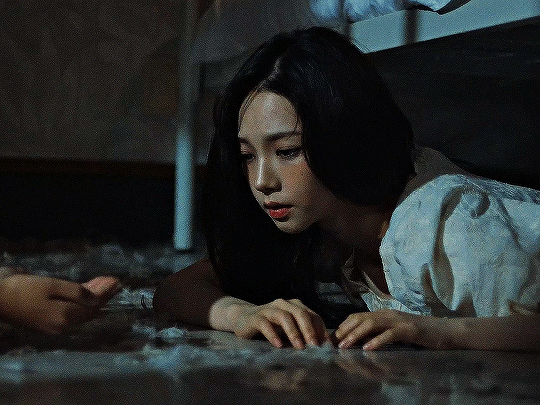
Karina and Giselle visit a fortune teller's tent to learn about their romantic futures. The fortune teller tells Giselle that her boyfriend is like a heroic protagonist in her life, while Karina's partner, Y/N, is described as resembling a fairytale villain.
GENRE : Fluff
TYPE : One Shot
Karina and Giselle strolled through the park on a sunny afternoon, their laughter filling the air as they enjoyed each other's company. They had always been inseparable, sharing secrets, dreams, and the occasional gossip about their respective partners. Today, their adventure would lead them to a mystical tent, where a fortune teller promised to unveil the secrets of their love lives.
Intrigued by the idea of peeking into their romantic futures, they stepped inside the dimly lit tent. An elderly woman with wise eyes and flowing robes welcomed them. She introduced herself as Madame Isadora, a renowned seer who had been reading destinies for decades.
Giselle couldn't contain her excitement and eagerly volunteered to go first. She asked Madame Isadora about the fate of her relationship with her boyfriend, hoping for a positive prediction. The fortune teller closed her eyes and whispered incantations, her fingers dancing gracefully over a crystal ball. After a moment of silence, Madame Isadora opened her eyes and smiled.
"Your love, dear Giselle, is like a tale of a hero riding in on a white steed to rescue you from the perils of the world. Your boyfriend is your knight in shining armor, ready to protect you no matter what."
Giselle blushed with joy, her heart fluttering at the romantic image painted by Madame Isadora's words. Karina, who had been observing with a hint of jealousy, couldn't help but wonder if her own love story would be as enchanting.
Despite her skepticism, Karina thought the fortune teller might be a fraud. She was a realist and didn't put much stock in such predictions. When it was Karina's turn to be read, she asked if Y/N was similar to Giselle's boyfriend. The fortune teller chanted the same incantation as before, and when she finished, she seemed surprised. Karina, watching the fortune teller's expression, grew a bit anxious, fearing that the reading might not be what she hoped for.
"Your partner, Y/N," Madame Isadora began slowly, "is unlike a hero in a traditional story. In fact, Y/N resemble the Villain of a fairytale."
Karina's heart sank, and she felt a pang of disappointment. To be compared to a villain was not what she had hoped for. Madame Isadora, sensing Karina's unease, continued her explanation.
"But, my dear, do not be disheartened so quickly," she said. "In a story, the hero may sacrifice you to save the world, but a villain would sacrifice the world to save you."
Karina was puzzled by the cryptic words. She didn't understand how someone like Y/N, her beloved partner, could be compared to a villain. Madame Isadora saw the confusion in Karina's eyes and continued to clarify.
"Sometimes, love requires unconventional sacrifices. Y/N would move mountains, change the course of fate, and even challenge the world itself to protect you. They would be willing to do anything to keep you safe and happy, even if it means playing the role of the villain in the grand narrative of life. Y/N would turn the world upside down for your sake."
Karina was taken aback by Madame Isadora's explanation. It was a perspective she had never considered. As she reflected on her relationship with Y/N, she realized that there had been moments when Y/N had gone to great lengths to make her feel cherished and secure.
Karina's first impression of Y/N had been that of a thug, given Y/N's imposing stature, sharp gaze, and stern countenance. One evening, Karina had almost been harassed by a group of guys who were intent on bothering her. As a famous idol, she had her share of stalkers, and this night was no exception. However, just before things could escalate, Y/N had arrived and brutally dealt with the troublemakers.
That had been the first time Karina and Y/N had met.
"Are you okay?" Y/N had asked Karina, but Karina, watching Y/N's actions, had been frightened. Y/N, sensing Karina's fear, had quickly pulled out their phone and called the police.
As they waited for the police to arrive, Y/N had noticed Karina was cold and traumatized, Y/N removed his jacket, wrapping it around Karina for comfort.
The police had arrived promptly, they saluted Y/N With respect, who, as it turned out, Y/N held a high-ranking position in the police force – Superintendent General. The officers swiftly apprehended the stalkers, and Y/N instructed one of their female subordinates to escort Karina home.
Upon returning to the idol group's dorm, Karina's friends ask about why she had come home with a police officer. Karina had recounted the incident to her friends.
"Aren't you going to thank your hero?" one of her friends, Winter, had asked.
"I was too scared at the time, so I forgot to say thank you. Oh no, I also forgot to return their jacket," Karina had said with sadness. She should have been very grateful to Y/N, but she didn't even know their name. And she had forgotten to return Y/N's jacket.
"You should go thank them and return the jacket tomorrow," Ningning had suggested.
The next day, Karina had gone to the police station to find Y/N. Fortunately, she remembered which police station Y/N had been from when she was escorted the previous day. Upon arriving, she had met the female officer who had accompanied her before.
"Are you looking for Inspector Y/N? Wait here, I'll check if the inspector is in the office," the officer had told Karina.
Karina hadn't expected that Y/N held such a high-ranking position in the police force. Y/N had a young and handsome face, which belied Y/N true role.
"The inspector is in the office. Follow me, I'll take you there," the officer had said.
Finally, Karina had met Y/N, and they had exchanged introductions. Karina expressed her gratitude and returned the jacket, to which Y/N humbly responded that it was their duty to protect citizens.
Karina had then suggested going out for a meal as a token of her appreciation, and though Y/N had initially declined, Karina had used her aegyo (cute and charming behavior) to convince Y/N. Eventually, Y/N had agreed to dine with Karina.
This marked the beginning of their closeness. Karina gradually learned more about Y/N – a person of few words who only spoke when necessary, always honest in their words, and had a sharp, intimidating gaze that most people found intimidating.
Unlike others who treated Karina as an idol, Y/N treated her like an ordinary person. This made Karina feel comfortable around Y/N. Y/N didn't put her on a pedestal, and this was something Karina greatly appreciated.
One of the reasons Karina cherished Y/N's company was that Y/N unintentionally pampered her. Y/N was gentle with Karina, and she enjoyed the small gestures of care, like wiping her mouth after she ate or stroking her hair. As the leader of an idol group, Karina was used to taking care of her group members, so experiencing someone pampering her was a rare and delightful sensation.
Their meals together gradually evolved into outings – watching movies, going on vacations, and spending more quality time together. Over time, Karina fell in love with Y/N, and they eventually became a couple.
Thats the story of karina and Y/N.
With a newfound understanding, Karina and Giselle left the tent, their hearts and minds filled with thoughts of their respective partners. As they walked home, Karina couldn't shake the feeling that perhaps her love story with Y/N was destined to be extraordinary in its own unique way.
Days turned into weeks, and Karina's curiosity about Y/N's true nature grew. She couldn't help but notice the small, thoughtful gestures that Y/N made to ensure her happiness. Y/N would surprise her with her favorite flowers, cook her favorite meals, and stay up late talking about their dreams and aspirations. These actions, once seen as insignificant, now took on a new meaning in Karina's eyes.
One evening, as the sun dipped below the horizon, casting a warm, golden glow over the city, Karina decided to call Y/N. She missed them terribly and wanted to meet up. Y/N eagerly agreed, and they set a date for the following day.
When they met at their favorite café, Y/N greeted Karina with a warm smile and a bouquet of her favorite flowers. Karina's heart swelled with love and gratitude. As they sipped on coffee and shared stories, Karina couldn't resist bringing up their recent visit to Madame Isadora's tent.
"Y/N," Karina began, "Do you remember when I told you that Giselle and I had someone's fortune telling?
Y/N nodded, their gaze locked on Karina's. "I do. It was quite an unusual prediction."
Karina hesitated for a moment, searching for the right words. "Well, I've been thinking about it, and I've come to realize that being the 'villain' in our story isn't such a bad thing."
Y/N raised an eyebrow, curiosity piqued. "Oh? How so?"
Karina took a deep breath. "That Madam explained that a hero might sacrifice the person they love to save the world, but a villain would sacrifice the world to save the one they love. I've seen how far you're willing to go to make me happy, to protect our love, and to ensure my well-being. You've done things I couldn't have even imagined. You've become my own kind of hero, Y/N, even if it doesn't fit the traditional mold.
Filled with the kind of love that could move mountains and defy destiny itself. In the end, it didn't matter if Y/N was the hero or the villain because, in Karina's heart, they were simply the love of her life, and that was all that truly mattered.
PART 2
My Masterlist
#karina x reader#karina fanfic#karina oneshot#aespa oneshot#aespa imagines#kpop oneshots#kpop imagines#karina#karina aespa#aespa karina#oneshot#karina imagines#yu jimin#kpop fanfic#kpop fluff#fluff#aespa fluff
121 notes
·
View notes
Note
riverdale is.. schrodinger's show? ??
lol re tags on this post i assume? this is actually alfie @hypokeimena's phrase #alfiepilled and literally just means that he does not watch the show but does watch us watch the show and so always at any time any plot point or series of events is possible because riverdale exists in a state of totipotency right up until the moment of viewing the footage to see what actually happened which again he crucially never does.
HOWEVER i have adopted this phrase into my own riverdale lexicon because i think it helps to get at something which is usually kind of difficult to articulate about riverdale's method. riverdale, more than your typical tv program, IS a show where anything can happen, and that quality has not changed or diminished over the course of its run. typically, in tv, as you build out the world and the characters, you become better able to predict what will happen next; the window of probable events grows smaller, even if only slightly. people pair off, foreclosing other relationships; they pick a career, choosing one life over other possible lives they might have lived. even shocking plot twists are operating under a set of basic rules that govern how the setting and the genre operate such that the overarching parameters of what is possible in the world don't change. but not so in riverdale! it's not committed to the sanctity of its own canon, which frees the team up to create a show that reminds me more of a collage; different narrative pieces get swapped around to see what kinds of meanings they might produce with very little preciousness about continuity or canonicity compared to other programs. different storylines are repeated by filtering them through new genres to see what emerges. season 7's premise is a perfect example of this!
the other thing about riverdale that makes it schrodinger's show to me is that it is always operating on multiple registers of reality simultaneously, so that any number of things might be happening at once depending on how you're reading it. for example, in the season 3 g&g plot, many episodes are framed by games of g&g that precisely mirror real-world events going on concurrently in town, e.g. jughead accurately describing archie's prison break as it's happening even though he's not physically there. maybe this is just an extradiegetic narrative device; maybe particular characters are omniscient or psychic in some way; maybe the game itself has powers that allow it to shape the world or the story; maybe riverdale itself only has a certain number of pre-set stories that it can tell. the list could go on. the point is that all of these are equally likely; riverdale does not privilege realism or groundedness, really the opposite, but neither does it often confirm for certain that something supernatural is happening. rather, the viewer is left to interpret for themselves; to choose between these options if they want, or perhaps instead to hold them all simultaneously. indeed, riverdale never forces you to pick, to narrow it down; in riverdale, more than any other show i've ever watched, you can have everything you want, and you can have it all at once, because there is no definitive reality, which means everything is pretty much equally (un)real. the cw is pioneering quantum television and we're here to witness it! what a time to be alive!!!
225 notes
·
View notes
Text

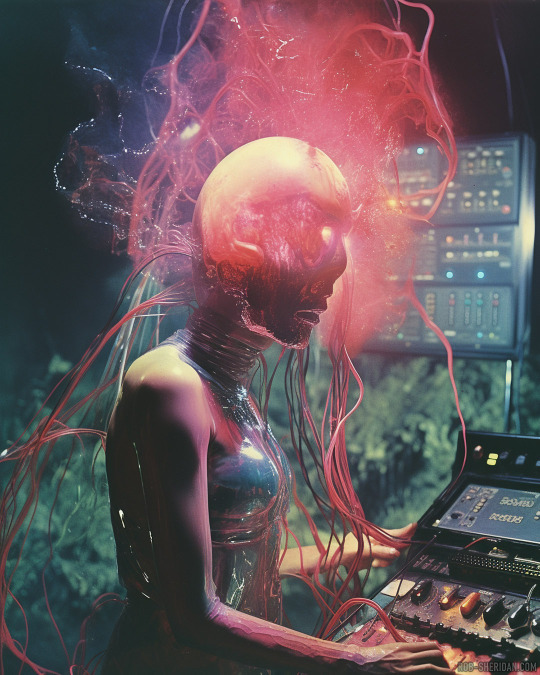
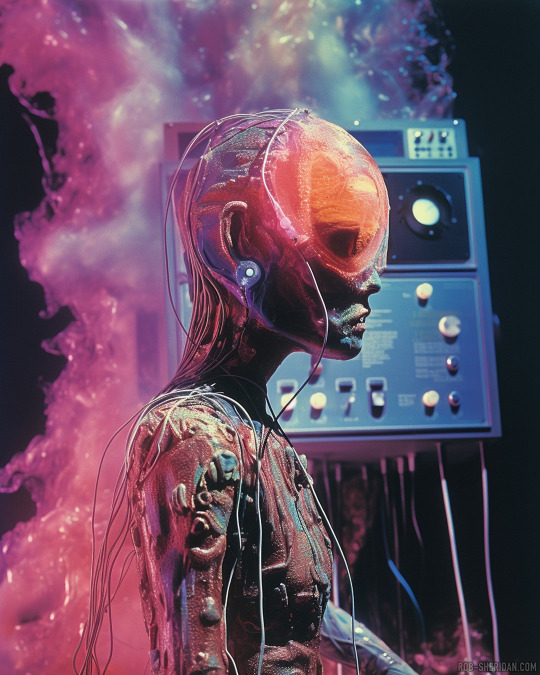
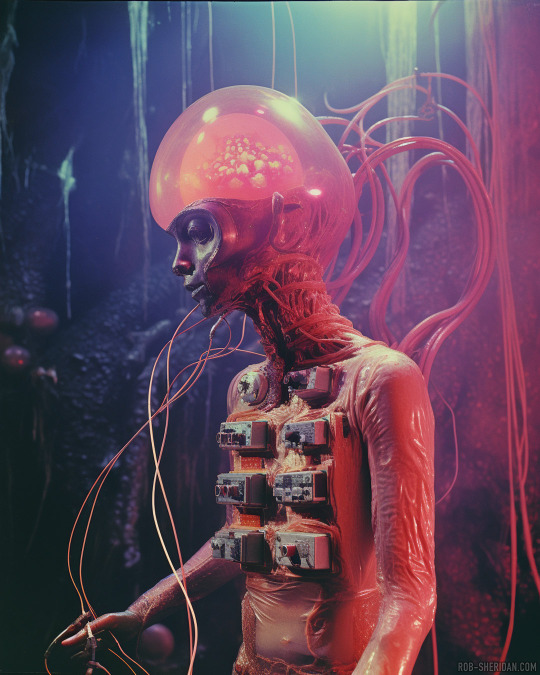


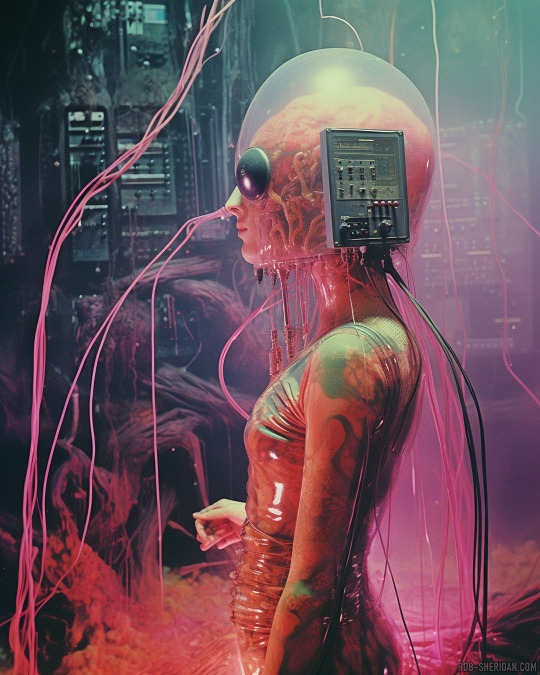

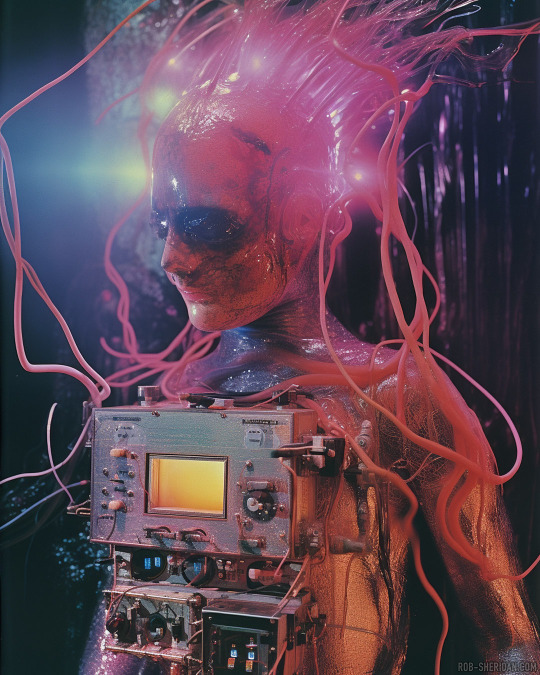

Members of London’s 1981 electroplasm scene, a fusion of extreme body modification, mortality edging, and electronic music, where specific frequencies generated by custom modular synthesizer hardware were found to stimulate spectral wavelengths enough to generate ecloplasm and control its psychokinetic growth into electronic wiring, creating sounds unlike anyone (living) had ever heard before.
The most hardcore electroplasm musicians, flatmates at a warehouse space they called The Cortex, began fusing their nervous systems to the hardware such that the electroplasm could flow through their bodies, syncing with their biorhythms, turning them into electronic posthuman processors in a chain of spirit-charged flesh modules. As the ectoplasm rewired their brains and warped their forms, they were no longer technically “alive” by standard definitions, but held on the bleeding edge of the mortal plane by the spirits trapped in them, howling supernatural tones they shaped with their body instruments.
As the niche scene grew, more devotees joined the chain of spirit vessels in The Cortex, giving their bodies to the rhythm, building the beat, forming new otherworldly sounds with each new human instrument. These “beat zombies,” as NME coined them, could only continue “living” as long as the sonic frequencies continued through the chain, and so the beat at The Cortex ran 24/7, their “musical life support.” Hundreds of fans gathered to dance at the undead rave, the most unique performance art ever seen; some predicted the sound would last forever, growing so big that one day every human who ever lived would become connected to it, a jam session across all souls, here and beyond.
Unfortunately, the entire electroplasm scene ended abruptly just a few months after it had begun, when the power was cut to the warehouse space, killing all 78 posthuman vessels instantly and releasing all of the spiritual energy trapped within them at once in a psychokinetic blast that razed four city blocks. It turned out that when the musicians gave their minds & bodies to electrically-charged ectoplasmic sound, they never thought about who would pay the utility bills.
---------
NOTE: This alternate reality horror story is part of my NightmAIres narrative art series (visit that link for a lot more). NightmAIres are windows into other worlds and interconnected alternate histories, conceived/written by me and visualized with synthography and Photoshop.
If you enjoy my work, consider subscribing to my free newsletter to stay up to date on my projects, or supporting me on Patreon for frequent exclusive hi-res wallpaper packs, behind-the-scenes features, downloads, events, contests, and an awesome fan community. Direct fan support is what keeps me going as an independent creator, and it means the world to me.
#synthography#synthography horror#80s synth#alternate history#ai art#ai horror#nightmAIres#rob sheridan#horror stories#ai sci-fi#sci-fi#writing#80s music#electroplasm
125 notes
·
View notes
Text
Explaining WillEl's Narrative Duality— With Charts!
Today I want to talk about the duality of Will and El's storylines and how paralleled the two are, and to help explain I've drawn little diagrams! (or, me forcing everyone try and read my handwriting)
This will probably be a multi-part post, but I'm going to start with season one since it is the easiest to explain, but also looking at just season one gives a good incite into where their individual arcs are heading.
First, let's start with the narrative backbone— Joseph Campbell's Hero's Journey
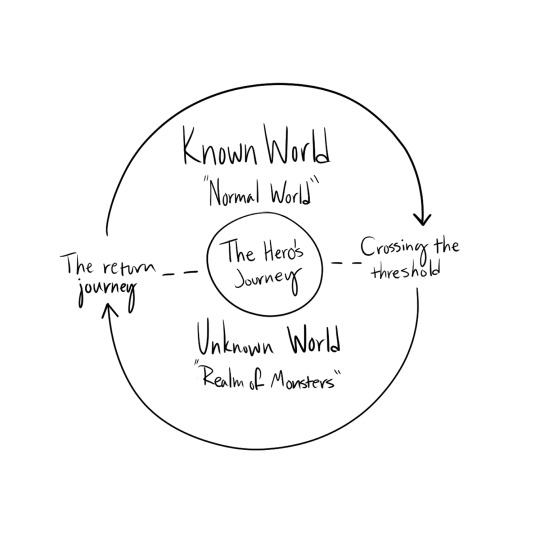
The Hero's Journey is literary cycle that Joseph Campbell proposed all stories follow. Now whether or not all stories follow it is debatable, but ST actually follows it to a T.
I've simplified it for the sake of this post, but the general gist of it is that the hero starts off in the Known World, or the "Normal World," and then "crosses the threshold" into the Unknown World, or the "Realm of Monsters" as I'm calling it on my little chart. The hero then ends the cycle when they make the return journey back to the Known World with the knowledge they have gained.
Pre-season one, El and Will are sitting on opposite ends of the chart, Will lives in the Known World and El lives in the Unknown World. This will make more sense as I continue explaining.

I guess it's important to note that parts of the Hero's Journey is meant to be transformative based on the work and character that it is applied to. The Unknown World here is the known world to El, but from an audiences perspective her world is the unknown one, thus why I've placed her on that side of the chart. Will and El both follow the same steps of the chart in the same order, but whether they are in the Normal World or Realm of Monsters is different.
Once season one begins and we have our inciting incident, both characters cross the threshold onto the other side of the chart. They basically switch sides. El escapes the lab entering the Normal World and Will is taken to the Upside Down, or the "Realm of Monsters"
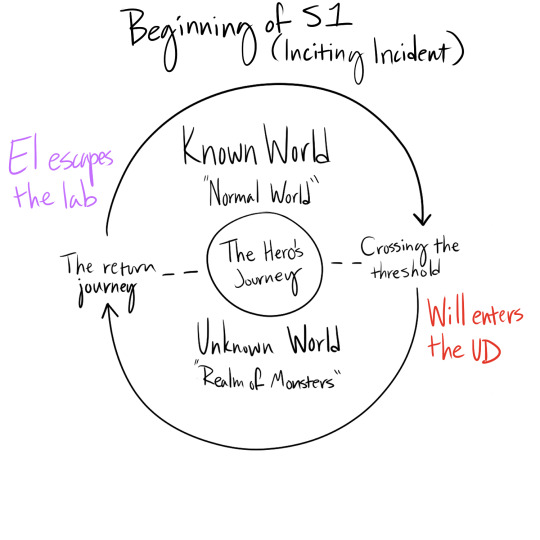
We see a lot more of El's story then we do with Will's, but for most of the season Will and El are basically living out opposite arcs. I think if you consider Will having powers, this is especially true.

El is a girl with powers who is learning how to navigate the conventions of the normal world.
Will is a normal boy who is learning how to navigate his powers in the unknown world.
If El is going to survive in this new environment, she has to learn how to dress and act like a normal girl. She has to learn what normal girls wear and what a friend is and how to make promises, all things that kids in the Known World, like Will, are already familiar with. On the other side of this chart, if Will is going to survive his new environment he has to learn how to use his powers. He has to learn how to control the lights so that he can communicate with his mom, something that kids in the Known World would not know, but that kids from the Unknown World, like El, would know.
The climax of season one is when their respective "monsters" are closing in on them. The Demogorgon (Vecna) gets closer to Will and Brenner gets closer to finding El.

Will and El then end the season on opposite ends of the chart once again, having both made their return journey.
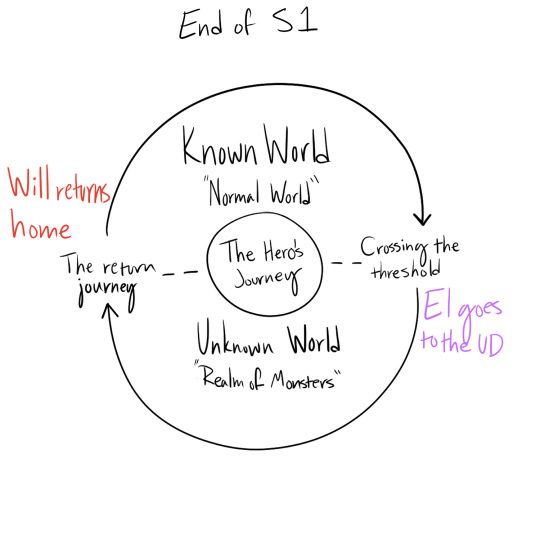
(Of course, the story doesn't end there, but this is the resolution that is offered for the first season)
Like I suggested towards the beginning of this post, I feel like examining their respective storylines in this way could help predict the projection of their arcs in season 5, and what the core of their arcs are actually about.
An important aspect of The Hero's Journey that I didn't illustrate on my little chart is "Master of Both Worlds" or the step toward the end where the hero is a master of both the Known World and the Unknown World. This is a step that we haven't quite seen yet with neither Will nor El.
This goes along with my post here where I speculate the conclusion of Will and El's arcs, which includes El becoming her own person outside of being a superhero and Will becomes the chosen one. Considering that Will started off in the Known World and El started off in the Unknown World, the goal for each character has to be about mastering the opposite realm. Will is likely going to become a master of the Upside Down and his powers, and El is going to come into her own person outside of her superhero identity.
#willel#stranger things#stranger things 1#stranger things analysis#the hero's journey#my analysis#will byers#el hopper#i feel like i just barely scratched the surface with this#their narrative duality is so much more than just this#but i wanted to keep this short and just introduce this concept#but will likely be using this as a backbone for other posts in the future#and expanding on it#will byers has powers
166 notes
·
View notes
Text
NETTLES AND THE IDEA OF INNOCENCE

Innocence, especially for women in asoiaf has a particular place in their perception.
Innocence in our world holds a very similar place.
When a character is innocent, you want better for them because any turmoil they go through is undeserved, and by the rules of both societies, it should allow them to be exalted from hardships.
So when it comes to such a small character like Nettles the idea of her innocence is perpetuated past the character we have because she is exalted from the concequence of what she is accused of in the narrative and is redeemed from all the hardship she faces towards the beginning when she claims a dragon.
But I don't think that's fair or correct so I want to go over some things we know and hear about her that people use to defend this idea of innocence and come to the conclusion that even though she is innocent it's not in the way typically attributed to her.
1. Nettles and Sheep:
Her relationship to this animal is a fun metaphor to understand her. Nettles trades sheep to gain her dragon Sheepstealer. Nettles trades innocence for power.
"Lambs have always been sacrificial animals. From the Ancient Greeks and Romans to Christians and even later civilizations, lambs were used for sacrifice to a higher purpose. In most cases, it was the sacrifice to Gods.These are the qualities that make lambs so symbolic. "
"They are a sign of innocence, purity, vulnerability, and sacrifice. Many of these symbols overlap with the symbolism of youth."
The idea of innocence is something that her taming Sheepstealer inherently corrupts. She slaughters sheep every day to get close enough to establish a bond to him. It's a continued effort to trade innocence for power, and because dragons make Targaryens closer to gods than men, the idea is that she's offering a sacrifice to a 'god' to gain power.
I'll link my post about this parallel she has to sheep further.
Another thing is that she's young, and that plays a part in what she is absolved from in the narrative because of the nativity and ability to grow with the potential of youth.
2. Nettles and The Cost of Power:
The regression of this trade for power comes after Driftmark is sacked and burned. In the war effort that Nettles largely contributed to, she loses her friend and her home. We are told her reaction to the loss is crying through the soot on her face so hard it leaves streaks. As with what happens consistently in mythology, the protagonist reaps benefits and consequences in the quest for power. The cost of gaining that power was fighting in the war, something she knew would happen. The fact that it came at the cost of her closest known relationship at the time as well as the place she grew up and had to leave behind to join the war effort is conceivable but not predictable for anyone to know. Especially not a 16 year old girl.
3. Nettles and King's Landing:
A while back, I drew attention to the fact that in the book, we have no real evidence that Nettles had any of the promises made to the Dragon Claimers kept to her. No marriages, lands, or knighthood equivalents are given to her in the wake of the fight. A lot of people use this as a way to say she's innocent because she believes in a cause and is sticking by it. That doesn't seem accurate towards the situation. King's Landing is the capital at that moment for punishing treason. She's a young, grieving girl, experiencing the price of power in a place where her refusal to fight or her running away will be met with a death warrant. Nettles has a nose scar for stealing allegedly. She's one of the characters we know understands the cost of disobedience in this world. She is a cost they'd be willing to pay. Even with her dragon adding to her necessity during the war, they're executing Noble men at that time. Nettles' entire life in juxtaposition to their's is incredibly small. Whether or not she cared about gaining anything (I like to think they gave her money), it's very clear that it's a weary time with major consequences for defiance or treason.
4. Nettles and Daemon:
This is the one people use this idea of innocence the most frequently for. "Nettles was innocent of the accusation made against her (sleeping with Daemon, not witchcraft), and Rhaenyra was influenced and turned against her."
Nettles doesn't need to be innocent for what Rhaenyra did to be wrong. The men who defend Nettles against the decree say that Nettles is wrong but young and shouldn't be killed for that. They conceded that the idea of treason is fair, but the idea surrounding it with the spell implications is simply incorrect and will make Daemon kill them if executed. Daemon is the sole person who puts her in danger and saves her in this narrative for his own character arc. Nettles isn't innocent, but she is young. She has her life ahead of her and has done everything that is expected of her. She isn't punished for love by the narrative. It saves her life and allows her to escape the trapping of power altogether, something she never returns to traditionally.
She does return to it with the burned men, but entirely away from the system, she originally gained that power from.
5. Nettles and Treason:
She did commit treason. That's not an innocent thing. It quite literally required her sleeping with a married prince. Whether or not she's a virgin (we'll get to it) in this world, giving into sex outside of marriage or prostitution as a woman is framed as wrong because of the value of virtue for women. With someone like Nettles, she'd know it's a bad thing and still proceeds with it. While as prince consort and a man Daemon will never dare a lick of concequence for adultery, Nettles would, and treason isn't a far stretch for the crime. Even with the understanding that Daemon would protect her, that they seemingly have, it's not okay. (It is to me. She's completely innocent.)
6. Nettles and Virginity:
Virtue is a currency in this world. Sleeping with a girl and deflowering is seen as a commodity and milestone. Virtue for women is posed as an added value. Without it, as we see in the books, women without maidenheads are seen as a lesser offer often beneath the standard of noble men.
Nettles is not ever positioned as a virgin. In this world, it's a logical conclusion to draw that she is not and would've traded sex for food or money. I'm not saying that happened, but if it did, there seems to be a stigma that it makes her lesser character in the story and / or denies her own autonomy by demeaning her. With the way it is presented in the narrative, it's a fair conclusion to draw. It's said to deter the idea that Daemon would sleep with her because she isn't even worth it, and that's my issue with the she should be virtuous reading.
It falls into the temptation of a character doing what she must to survive being a way to demean her. Nettles was surviving every day before the sowing. Her having sex, prostitution or just because she could, should not shroud her character in any world. Nettles can exist as both a critical view of how Westeros treats girls like her and as an autonomous character who chooses whether or not to have sex given her situation without it being demeaning or derogatory towards her as a character.
7. Nettles and Sex Work:
To add on, sex work is often demonized in this world, and because of the poor class of women often in these positions who are quite young and have no real alternative. Nettles as a character would exist in contradiction to the narrative of not only sex workers who die or are brutalized in that life, think book Shae, Show Roz. She'd also be the one who is actively saved by the class of people who often perpetuate this system of abuse they exist in.
Nettles isn't in it anymore or has once been preyed on by the entrapping cycle that brothels perpetuate but escapes and makes her own way. She's foul-mouthed and marred because of it, but she also becomes a dragonrider, and then when she has sex it's because she wants to.
When the narrative tries to condemn her for it, she's saved by the person who puts her in that position, unlike the other girls, like Tysha, Nettles' value isn't placed on her past sexual partners, and she is like the other girls who fall victim to the predatory sex work establishments in ASOIAF, but she escapes and isn't punished in the narrative for sleeping with someone or trying to survive in the first place. Something we don't really see in this world.
Overall,
The overarching angle of innocence pushed on her character is extremely strange and does not benefit her as a character. Innocence in this world is based on patriarchal feudalism that commodifies women into property and places value on them like stock that depreciates with superficial nonsense.
Question this world.
Nettles isn't innocent and shouldn’t have to be to deserve the ending she gets. She can just escape because she learns and grows and is young enough to do it without major consequences for her.
Nettles is innocent however, in the narrative of a poor, homeless girl with nothing, accomplishing a tremendous feat and gaining power from it, being used in wars and fights that have nothing to do with her and having the threat of death looming if she doesn't comply.
In being used as a means to an end in a conflict between the two most powerful people in the realm and escaping without any permanent concequence to her. She's not guilty.
Let girls have fun and be complex characters in their narratives. Innocence isn't a necessity, but even if it was for you to like her, she is, in a sense, innocent.
#house of the dragon#hotd#a song of ice and fire#nettles#nettles asoiaf#netty#daemon targaryen#rhaenyra targaryen#shae#roz#tysha#nettles and sheepstealer#sheep symbolism#sheepstealer#innocence#my little war criminal#daemon x nettles#house targaryen#anti asoiaf feudalism#pro asoiaf women#innocence in this world doesn't ammount to anything#why should it deter good characterization?#men do the absolute worst things and still get redemption arcs#why can't she when she's just sort of not the best?
72 notes
·
View notes
Text
As I continue to scratch like a little beast at the concept of fate in Patho Mark Immortell unfortunately needs to be discussed. Specifically Mark in Patho Classic, because he’s just so……. What the hell is going on with that dandy Mephistopheles. I have to know.
Mark is clearly cognizant of Patho’s narrative to an extent, and seemingly represents another play on “lines” as a mechanism for prophesying in Patho. As Artemy knows the lines in viscera as a Haruspex, Yulia/the Mistresses know cause-and-effect chains/threads of fate, Mark knows the lines as in theatre. Eva describes Mark’s performances thus: “Staggering, prophetic performances! They predict fates. […] Two ritual Masks pick a volunteer from the crowd. Mark looks at his hands, then shows them to the Masks. They improvise. Without a word they play out either the nearest future or the whole life of the person—depending on the price. And it always comes true!” Notkin says, “They say they tell your fortune, right? Might be just a game, might be note; it does come true. I think though that it’s Mark himself who manipulates the events to align someone’s life with his ideas. […] I mean, [his predictions] do come true, though not every time, and if they don’t, he explains it away as a metaphor, or says they did come true but we didn’t notice.” Notkin differs from Eva’s depiction somewhat; at least, he complicates whether Mark’s performances really come true, and this reliance on metaphor to me is reminiscent of an idea in Patho where obfuscation, story-telling, or performance are the most efficient means to communicate truth (lovely Nina is an apparent exception but I am not talking about that right now <3).
For instance, a Town child tells the player, “Mark—he knows the truth and is afraid to distort it. That’s why he uses masks, puppets, and riddles.” This echoes Katerina’s line, “I can’t leave my smoke and mirrors be […] Because I cannot lie when it comes to details… My lips literally cannot enunciate something that is untrue. Riddles and vagueness leave me a degree of freedom.” Mark himself voices something similar: “Like any game, play-acting is a mere shadow of Existence, a tiny fragment of it, a semblance—not a hollow semblance, mind you, quite the contrary, filled to the brim! Play-acting is fuller than reality... since it’s smaller.” To me, this gestures to how storytelling and theatre—with their ability to exaggerate reality—allow one to address issues in a roundabout way which can be more efficient than clear-cut truth. Simplicity is absolutely a necessary tool, but can inevitably hinder necessary nuance, and I think that is what Patho is getting at here. Similarly, it’s suggested that people *interpret* these plays rather than the acts being clear depictions of future events, e.g. when Mark talks about the bull in the Bone Stake Lot incident: “Everybody started to talk about it, interpreting and reinterpreting the… act. Just like they do with our very own Mask Act here. The prophetic excitement is growing by the hour…” just as he later says, “No, I am no longer a mime show interpreter.” All this suggesting that Mark perhaps interpreted simulacra or semblances, and this is how he understood Pathologic’s narrative.
Characters further suggest that Mark’s Masks did not merely show the future, but enforced it. Daniil says, “You were a puppeteer. Your Masks foretold our future—or maybe imposed it upon us; in all honesty, I don’t see the difference.” Maria similarly states, “his performances don’t show a person’s fate, they impose it,” and Lara says, “Mark’s mime shows seem to incorporate us too… everyone’s playing along to avoid disrupting the performance, and that’s exactly how he’s manipulating us.” I interpret this from the meta angle, because obviously the Theatre demonstrates the game’s events, which the characters act out because. Well. They are characters. Even Mark doesn’t appear above it all, as Lara says “I think it’s the Masks who play him and not the other way around,” and Mark refers to himself as an actor, such as when he muses that “I’ve been thinking about leaving this place of the dead for a while now, but I get the feeling that this is exactly the place for me to fulfill my part…”
Though, Mark obviously more often references the player’s role as an actor, which again points to his understanding of fate. Namely when he tells Daniil “[The next performance is] for you to decide. You are part of the lineup. The playscript is not yet complete, you see. […] Your fate isn’t bound yet. It will take time, effort, and of course your direct participation. Come to see us every evening. We’ll show how you’re doing bit by bit.” This dialogue is obviously stepped in the meta: the playscript depends on our actions, as the game unfolds according to our choices in words and deeds. This reminds me of how the Mistresses and Simon’s fortune-telling all seems to juxtapose predetermination alongside some kind of free will. That is, while there is room for a player to subtly influence the narrative’s progression, it is obviously all set out for us in the end. It has to end in a particular way, and it feels like this is what Mark understands. Namely when he discusses the three families with Daniil, and when Daniil asks which will be victorious, Immortell says, “You don’t need me to tell you that; the answer is yours. They're so different... Which one do you prefer? […] It's up to you.” Mark knows that the player must inevitably side with one philosophy according to their choices: choice decides the outcome, but that outcome is obviously already determined.
Mark instead tells Clara that she is “against the rules” because she is “an imposter and a changeling.” Against the game’s rules, presumably as Clara is the only character capable of breaking her fate and so going off-script, as it were, in Mark’s performances. In the secret endings, the gamemakers say that Clara’s twin was a “gimmick of choosing one’s own fate” and that “She was indeed conceived as a disease, an instrument of the Law… but she was born a thief. At the very moment of her birth, she got a chance to become someone completely different. The girl came into this world, having stolen for herself the fate of a miracle-worker.” From a mechanical standpoint, Clara is obviously unique in that she has a choice—most people probably know that curing all the Bound allows you any choice, but that aside, Daniil and Artemy have only one decision. So setting aside that Clara obviously is still bound by a preset narrative, she is capable of choosing to oppose her predetermination and thus the capital-L Law, as fate/inevitability/the Law are closely intwined and often conflated. Breaking the Law is indeed ‘miraculous,’ which is referenced in a dialogue between Imortell and Daniil about the Polyhedron:
Mark Immortell: […] First of all, I also believe in lofty ideals—don’t let anyone tell you otherwise. […] But recently I came to realize something that has blown me out of the water completely and made me reevaluate my worldview. So... I believe in Vlad's transformation.
Bachelor: What did you realize?
Mark Immortell: That fate can be overcome. I’m so tired of all this... You know, many people consider my shows to be mere tricks—but I know that’s untrue. They are daily reminders of Predetermination reigning over us... it’s depressing. But now I see that a miracle is not completely impossible.
Bachelor: Please, go on! What makes it possible?
Mark Immortell: It’s the Tower. The only thing that leads the plots of my performances astray is the Tower. The Tower—and everything that has to do with it... those are the only things that cannot be tossed and turned and manipulated like puppets. A miracle overcomes the inevitable. The Tower can do miracles. It all makes sense.
Bachelor: I’m not sure it does.
Mark Immortell: You will still have an opportunity to ponder it. The Tower is an ambiguous phenomenon. There’s no need to rush to conclusions. I have, as you can see, fallen in love with it... I think of it as my safe haven. But you should keep a cool head.
I am gleeful about this dialogue btw there is so much to work with here. For one, it maintains the link between opposing fate and the miraculous found in Clara’s character, as Mark’s conviction that “fate can be overcome” derives from the Polyhedron’s capacity for miracles. Again, then, the miraculous is positioned opposite inevitability and fate. But what is Mark’s actual relationship to Utopia and the Utopians? I have always wanted to throw up blood over Daniil and Mark’s final conversation. When he tells Mark, “I thought that the whole point of the Utopians’ ideology was neglecting the laws of fate and the limits it imposes upon us,” to which Mark replies, “You are correct, oh the keenest of the astute! So what? I have cognized this side of Existence from backstage, so to speak; from where the strings go and the machinery is hidden—and yet I willingly swore allegiance to the Utopia. Does that tell you nothing?” That line goddamn haunts me. It always reinforced to me that there is an undercurrent in this game that people should strive for utopia, even if it’s a perpetually doomed endeavor, given Saburov and Eva’s statements to this effect. Mark appears sincere in this, given his “I also believe in lofty ideals” or how he gives his life to Maria; Katerina claims that Maria is the only one who can influence Mark, and indeed we see his collusion with Maria in the Changeling Route.
But Clara throws potential doubt on Mark’s allegiance to the Utopians when she reports to Katerina, “He’s not one to side with either the Utopians or the Humble. He stands apart.” [or] “Maria thinks he’s under her charms and in the ranks of the utopians. He’s playing along [with her]. But that’s not how it really is!” I think Mark could well be playing along with Maria, considering a dialogue with Andrey where he suggests that Mark “Claims that the local mimes can tell the future. As for me, I think he’s making fun of the Mistresses—and, by extension, of us all.” Maria herself says of him, “He makes me anxious; his performances don’t show a person’s fate, they impose it. I’d really like to see someone grab and pull the puppeteer’s strings. […] one day I shall tame this crafty imp—no matter what it takes.” “Makes me anxious”?? Maria of Scarlet Mistress fame ??? This reminds me of Mark’s voice lines “There is a great ability in knowing how to conceal one's ability,” and “It is sometimes necessary to play the fool to avoid being deceived by cunning men.” These lines need not necessarily be related, but imply a deceptive character that suggests he could be following Maria’s lead out of amusement.
Another suggestion that Mark is taking the piss is that he quotes Professor Pangloss from Candide, who represents the naïve optimism and theodicy Voltaire lambasts: “All is for the best in this best of the worlds” (Всё к лучшему в этом лучшем из миров/Tout est pour le mieux dans le meilleur des mondes possibles). The Utopians are not necessarily naïve optimists, but are dreamers who ascribe to the miraculous, even emphatically self-proclaimed rationalist Daniil. Theodicy also intended to vindicate divine justice, and Patho’s narrative involves its own ‘divine justice’ through plague; so Mark quoting Pangloss feels quite tongue-in-cheek to me.
Whether Mark is a sincere Utopian… As with everything, it’s open to interpretation. I think he is, given that dialogue with Daniil. Mark seems aware that he is only pulling people’s strings in that his performances reflect a predetermination that he is subjected to as much as everyone else. He appears genuinely intrigued by the miraculous (as in: fate can be broken) in his claim that he has fallen in love with the Polyhedron as Daniil or Eva. Likewise that he claims Clara is a “worthy opponent” as a miracle-maker, given that she defies fate and so overcomes the inevitable. I find it particularly notable that Mark considers the one thing that ‘leads the plots his performances astray’ his “safe haven;” but, I also think Mark is frankly cheeky about the whole affair because of his narrative awareness which also sets him apart from other characters.
#this one's for you Ruby#you understand my pain and suffering at being forced to think about Candide again#pathologic#mark immortell#patho.txt
19 notes
·
View notes
Note
Happy 4/13!
Happy 4/13 to you as well!
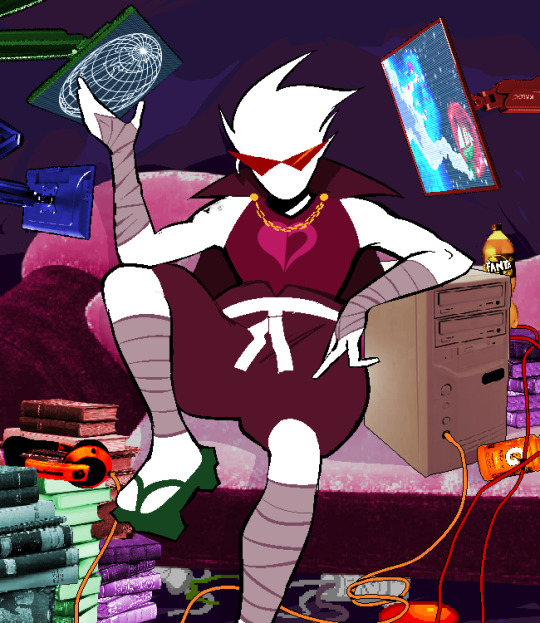
And, as I think everyone was predicting, there's new Homestuck Content today. I'm hoping this is going to be the big update where they get to the point and have the long-teased [S] page, but we're not looking good if we're opening with Dirk, whose primary character trade is long rambling speeches. This is the first we've seen of Dirk since the new team took over, though.
Ready to take the floaties off and dive back into the depths of the churning, primal ocean from which everything that matters in this story evolved, and to which it must inevitably return?
The idea that Dirk's CANON plan is ironically consisting of him sitting around idly discussing The Lore is a decent meta joke, but it got old after a page or two. Please do literally anything, Dirk.
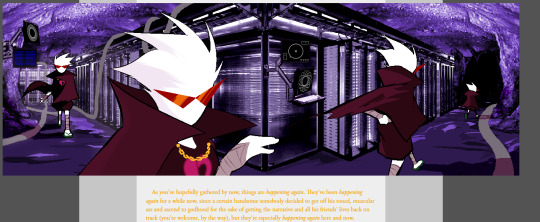
I do like this page, though, with the art busting out of the frame. And, given what I literally just said (I write these liveblogs as I read them), Dirk's opening by repeatedly insisting things are happening in his story is meant to be ironic. He's also claiming he became a god in order to do this HS2 stuff, which is flatly untrue. Presumably he means be became Ultimate to do narrative stuff, which is an interesting order of events if that's the case, and it's not that becoming Ultimate made him evil. Also, let me put some appropriate background music on.
youtube
Rose dipped pretty early on in that visual montage to spend some quality time trading barbs and bumping uglies with the supposedly impartial proctor of said Contest, next to the vacant meat-sack that once housed her consciousness. Irresponsible, sure, but to give credit where due, it was irresponsible in a poignant and symbolically weighty sort of way. Classic Rose shit
It does feel weird for the new team to be directly commenting on the quality of the writing of the old team like this, but to be fair, it is classic Rose shit.
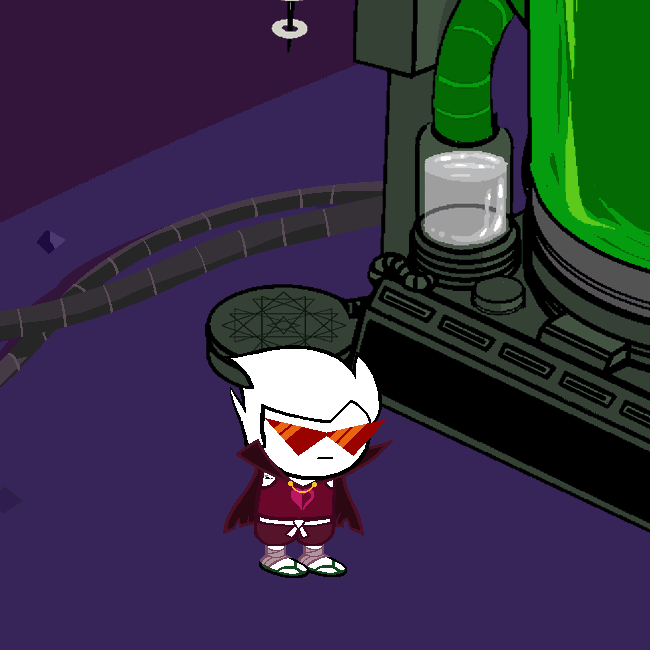
New Guardian Mode artstyle, which we were starting to see in Candy as well, since these characters aren't kids any more. But in Candy, everyone keeps their faces, whereas Dirk is just his hair and glasses, like Bro.
TEREZI: YOU H4V3 1NST34D CHOS3N TO W4T3RBO4RD TH3 R4W N3UR4L T1SSU3 OF MY TH1NKP4N W1TH 4N 4CR1D 4ND SUP3RFLUOUSLY OV3RC4RBON4T3D N4RR4T1V3 R3C4P DUMP
DIRK: Well, it's a recap for *you*.
DIRK: But for those who haven't checked in on us in a while, it's more of a stage-setting thing.
TEREZI: 1TS B4S1C4LLY 4 R3C4P FOR TH3M TOO, 1D1OT
TEREZI: YOUR 1N4B1L1TY TO SHUT UP 3V3N 4S YOU 4CT1V3LY CH4MP1ON TH3 N33D TO G3T TH1NGS MOV1NG WOULD B3 4LMOST 4W3-1NSP1R1NG 1F 1T W4SNT SO 4STOUND1NGLY OBNOX1OUS
Oh good, I turned quirks back on. There's a lot of meta complaining about the writing this update.
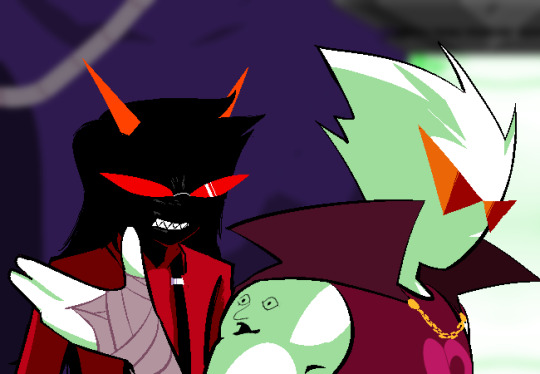
I do like that the humans are looking more like Guardians and the Trolls are looking more like Ancestors. It's odd to have them standing next to each in different art styles like that, but it kind of works.
DIRK: Or was all that hand-wringing about how worried you were that Rose and I were becoming big bad cosmic tyrants with no regard for the poor little mortals buffeted to and fro by the vicious momentum of our designs just virtue signaling?
Dirk's use of the term "Virtue Signalling" is probably worth making a note of here. HS2 has sort of flirted with the idea of Dirk as right-wing, and that appears to be continuing here.
TEREZI: 4NYON3 WOULD B3 GR4T3FUL TO H4V3 4 B3N3VOL3NT CR34TOR L1K3 YOU
TEREZI: ON3 TH4TLL ULT1M4T3LY 3NSUR3 TH31R 3NT1R3 PL4N3T 1S ORB1T4LLY BOMB4RD3D 4ND TH31R SP3C13S 4LL BUT DR1V3N 3XT1NCT S4V3 FOR 4 F3W "LUCKY" JUV3N1L3S
DIRK: That's just how this shit goes down for species *lucky* enough to fucking *matter*, Terezi.
There's a lot of speculation that the Candy kids are going to end up in the game as well, and that this is even something that the original cast over there is working towards. This would require, as Terezi points out here, literal genocide. And I think that is where the Candy story is going, with Rose/Jade/Jane all being in on it and Kanaya/Karkat being cut out, so it's nice of Terezi to remind us that Sburb is evil and that sacrificing an entire planet to help your kids become immortal is kind of a dick move.
DIRK: But hey, you say you aren't feeling it?
DIRK: Fine.
DIRK: I can make concessions.
DIRK: I've got other agents in play, and as I've said, I know you aren't going to risk fucking your end of the work up.
This is the kind of thing HS2 really need more of, stuff to speculate on. Terezi, Rose, and Dirk are literally the only three people on the entire fucking planet. What "other agents" could Dirk possibly have?
DIRK: You need this session to happen.
DIRK: You need a chance to fix the mistake you've got in that wallet, burning a hole through your pocket.
DIRK: You've made a lot of those, Terezi, but you know that besides being important, what we're doing here is a chance to rectify one of them.
DIRK: And you aren't going to let that chance slip.
TEREZI: ...
DIRK: I know what it's like to make hard choices for the people you care about.
DIRK: To run your brain raw thinking about how to make things right.
DIRK: I've been doing it my whole damn life.
DIRK: The choice you're presented with here is pretty fucking easy, and you're a very smart person, so I trust you to make the right decision.
Also, it's nice to have a little fucking narrative tension on this planet for once. Dirk and Rose are each creating an entire sentient race for the purpose of sacrificing them. Terezi is in a position to save the world, but doing so means giving up her chance to save John. Wow! Stakes! It's nice when stories have those, instead of just idly fucking around doing nothing for the sake of a meta-joke! Also it means the bad guy is being evil instead of merely boring, which is also a nice thing to do now and again.

There's not much to analyze in this art, but it's stylin'. The guardian mode look is great. Is Rose wearing lipstick on her robot face?
ROSEBOT: I've been very bad and I need to be punished
There's been a very subtle incest-y vibe with Dirk/Rose in Meat, and apparently we're keeping that too. Being sexually depraved is becoming like Rose's defining trait.
Localized time travel, while technically possible, tends to get pretty fucked even in the most ideal of circumstances, to say nothing of the fact that it's way outside my wheelhouse as a Heart player. The concept works pretty well for my purposes, though, and as a burgeoning omnipotent narrative god, I can mimic it in a way that's functionally identical. The move here is that I'm going to envelop the local galaxy group in a pocket of my influence and narratively accelerate it via Bullshit so that whatever's going on in here goes on faster, so we can get to the good shit faster, so we can get on with our jobs, and so you gawking voyeurs have more of our lives to guzzle greedily down.
Oh, that's kind of a cool ability, but also what can't an Ultimate do?
A while back, it became apparent that while my Deltritan offspring were to be terrestrial, Rose's were going to be aquatic.
Rose's team is going to win, and it's going to be the 48-player Squiddle session that creates the troll universe, making all of Homestuck canon an inescapable time loop through which no new ideas can emerge, except for the influence of Candy.
ROSE: For all my temporary discomfort with the prospect of settling down on Deltritus and starting what could very loosely be considered a family with you,
Rose he is your dad.
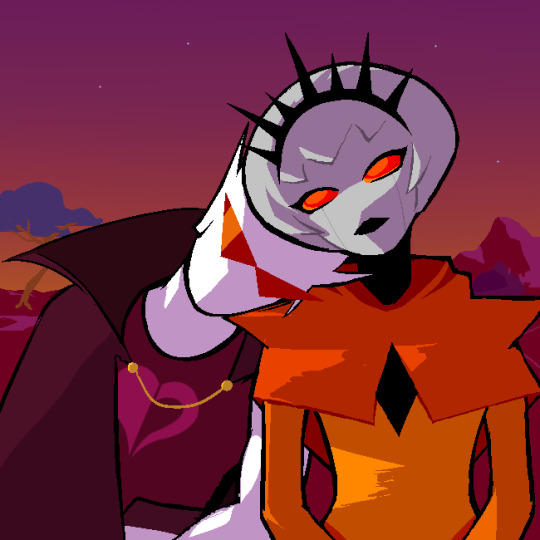
DIRK: I'm doing this for all of us.
Hm. No big [S] page and we still haven't gotten to the point, but we've made the Dirk half this story significantly less fucking boring, so I guess that's a win. This is an update the story desperately needed, giving Dirk some characterization and leaning in to how fucked everything here is.
Also, spending the entire update teasing a timeskip to the start of the game and then ending without doing it is a good meta joke, provided we don't keep doing it for ten more updates.
16 notes
·
View notes
Text
now what am I going to do with all these torn out calendar pages?
commuting thoughts:
The thing with writing is that a lot of writers want to address and challenge the injustice of systems in their work, but one of the easiest ways to do that is to pour the toxic traits of the system into one or two characters and let the defeat of that character symbolically represent the defeat of that system, even temporarily.
And that’s all well and good in some kinds of stories, but when we see it as the only kind of story, we run the risk of seeing injustice and bad systems as being about a Bad Apple here or there and not the systems themselves.
So far YR has chosen not to be a story about Bad Apples. Certainly, there are characters who are bad actors—some being badder actors than others, of course—but we’ve never been asked by the narrative itself to breathe easy because one of those bad actors has been taken down. The focus always comes back to the system, the social norms, the monarchy’s traditions, the ever watchful public eye, and so on. That’s what’s always been there underneath.
I’m so curious to see whether season 3 will continue leaning into this idea or whether it will, in the effort to move toward resolution for certain storylines, make the “defeat” of a character like Kristina or August the focal point of catharsis, a way of saying “don’t worry! we got the bad apples! the system is working just fine! the new system we created is TOTALLY not the old system what do you MEAN.” I’d be a little bit disappointed if they took that route, unless it was executed in a way that took me by surprise. It’s not that I don’t want certain apples of dubious moral quality to face some kind of “consequences”—but I would rather the consequences be the kind that facilitate eventual accountability and growth on that character’s part, even if we only see the beginning of the journey. I don’t want consequences to be punishment that’s solely there to make the audience feel good. (Like. We can feel good about it, sure. But I hope what I’m saying makes sense?)
So, yeah. I would be a bit disappointed if YR became the kind of show where the defeat of characters is meant to be the symbolic defeat of the system as a whole. And I think given how it’s been written so far it’s unlikely to become that show. But I also know it’s far easier to write stories about individuals and their interpersonal conflicts than it is to truly write stories about systems, and it’s harder to write stories about systems and pull it off well. so I feel a bit like I’m holding my breath until the end.
Anyway. You may disagree. That’s ok too! And these aren’t predictions, they’re just thoughts on themes. Frankly I’m wary of any analysis post where the author claims they know exactly what is going to happen in season 3. To me the purpose of analysis is to tease out themes and ideas and questions, not to figure out what happens next. I hope we’re all surprised in the best way.
41 notes
·
View notes
Text
ok since there are now less than 24 hours (!) until the finale I’m locking in my predictions
1. I think there’s definitely going to be an “I Love You” between Ed and Stede. We pretty much know there’s going to be a reunion kiss but I definitely think that believing Stede might be dead is the motivation Ed needs to admit his feelings to him. (Many of us also predicted Ed would fish up one of Stede’s letters in a bottle and the promo photos confirmed this.)
2. I do think Izzy is going to die. I don’t want him to, of course, but rumors are flying and evidence is piling up at this point. He’s at a satisfying point in his character development where his story would feel complete if he were to die, and as much as I want him to be in S3 I think his death could signal a narrative shift in which all of the characters realize “oh shit, things are never going to be the same”. If he does have to die, it would be really satisfying to have him sacrifice his life in order to save the crew that he’s come to love so much despite himself. Also, the “it’s about belonging to something” speech which we heard in the trailer feels dangerously like final monologue territory.
3. We know Ed, Stede, and Zheng are going to form an alliance to take down Ricky, and I think that after they do that, Stede is going to stay behind with Ed, and Zheng will take the remaining Revenge crew under her wing. I feel like there is going to be a separation of some kind, because either Stede is going to continue captaining and have a sort of mutual separation (not a breakup, more of a long-distance situation) with Ed, or Stede is going to say goodbye to his crew for the time being to finally get some fucking stability in his life. I do think the latter is more likely, though even just a few days ago I felt that the former was inevitable, so I guess we’ll see. Also, if the crew is separated at the end of the season it gives the writers an opportunity to have a The Muppets (2011) style reunion montage in S3 for a final voyage and I think that could be very fun.
4. I think the Revenge is going to be destroyed in some capacity. I have no basis for this but I just have a feeling. It’s another method to convey that things are changing.
36 notes
·
View notes